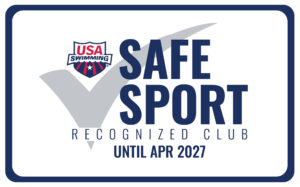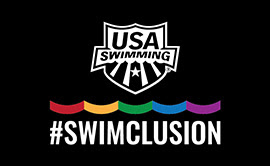Profile Essay by Niyati Mandhani
A brief history of Coach Cazz
It hadn’t snowed in 20 years. 15 year old Cassandra Esparza dozed in the passenger seat of a van driving on a Central Californian freeway, seat belt slipping over her shoulder. All of a sudden, the van hit black ice, sending it skidding into an intersection. Out of nowhere, a speeding pickup truck smashed into the side of Esparza’s car sending her flying. She missed the airbag completely and slammed into the dashboard, the seatbelt slicing through her middle. In milliseconds, aspiring olympic swimmer Cazz Esparza’s immune system, life and career went into shock.
Esparza, now in her 30’’s, is working as a swim, volleyball, basketball and soccer coach for youth around San Francisco. She started swimming competitively at the age of four, quickly finding her passion, when a tragic car accident derailed her swimming career. Esparza learned to adapt and cope with new mental, emotional, and physical challenges while maintaining her love for swimming.
Growing up, the pool was Esparza’s safe space. Esparza grew up in an extremely toxic household. She was being molested, verbally and physically abused from a very young age by her stepfather. As a teenager, she was a ward of the state, traveling between foster homes and family members’ homes, while attending counseling with child protective services to re-enter into her own home. At a point in her life where nothing felt consistent, swimming was a constant. The pool was a place for her to let go of her emotions and personal burdens. It was a place where she could be surrounded by people she loved. “Swimming was my medicine for all things not going well in life,” she said. “It was my place to go out and hit the water hard and push off the water hard and just let go of whatever energy it was.”
Becoming a professional, high achieving swimmer, was a ticket out of Esparza’s unsafe family situation. As she kept improving, going to finals and trials, winning medals and ribbons, Esparza saw swimming as a way out. She was going to be emancipated when she turned 17 and needed a steady income and somewhere to go when that happened. Swimming was her platform and she wanted to take advantage of that. Getting on the cover of magazines, getting to the Olympics would be a way to inspire others to work against setbacks and achieve anything. The faster she got, the more meets she went to, she saw that the Olympics was in her grasp. “If I could get to the Olympics, that was my ticket to independence, my financial freedom.” she said.
After the accident, Esparza had to start over, mentally and physically. The impact from the car accident left her with a hematoma the size of a football on the side of her head, a hole in her small intestine, damage to her frontal lobe, and 70 staples up her abdomen. Immediately after being airlifted from the scene, the doctors told her she would have to go through 19 hours of surgery and when she woke up, things would be very different. Weeks later, she woke up from a coma, her hematoma drained, her stomach stapled up, but without any recollection of her little brother. The brain damage she suffered left her with severe memory loss and a speech impediment. The physical injuries she suffered were devastating but the pain of losing memories of her family and her old self required much more healing. Simple, previously seamless tasks became difficult and new. “I became an observer, I became a student of life again,” she said.
The accident both abruptly marked the beginning of years of surgeries and medical issues, and the end of Esparza’s swimming career. In the year after the accident, she slowly eased her way back into swimming, working hard to get back to the competitive level. There was one thing standing in her way, the brain injuries she suffered couldn’t handle the impact of diving into the water. Once Esparza and her coaches thought she may be healthy enough to rejoin the swim team, she needed to complete an assessment of her skills. Esparza stepped up onto the block, feeling confident and excited to achieve the milestone of diving and competing with her friends again. The whistle blew and she sprung off the block hitting the water with an ear splitting snap. Something was wrong. Esparza didn’t know where she was, she didn’t know what to do, and she couldn’t see. For minutes, she was stuck under water just listening to people diving and swimming around her. After what felt like hours, she heard the voice of her coach and began moving towards it. She hit a wall, came up for air, and started puking her guts out. Sitting on the pool deck, surrounded by bright yellow puke, her coach came up to her, a sympathetic look on his face. He told her she had been stuck underwater for almost six minutes and wouldn’t be able to swim for a while. At that moment, Esparza realized that her life had completely changed.
Without many of the things that made Esparza, Esparza, she needed to find herself again. Without recollection of her old life, she was constantly surrounded by people who knew more about herself than she did. As she relearned how to write her name, remembered her brother, and grew into this new Cassandra, she was constantly reminded of the people who missed the old Cassandra. As she realized she would never be back to her old self, especially in competitive swimming, she found new ways to spend time in the water to cope with the stresses of her life.
Esparza found ways to stay in the pool and rekindle and redirect her love for swimming. At 16, Esparza became a junior lifeguard, started teaching swim lessons, senior night swim, and aerobics classes. She quickly accepted that being a decorated, competitive swimmer wasn’t the only ticket into the community, it was her love of the sport that guaranteed her a spot. When Esparza realized that swimming was never leaving her life, new opportunities opened up. Coaching and teaching was a way for her to pass on her knowledge and passion and build new bonds with young athletes. “ Swimming was my life, my medicine, my superpower before that accident,” she said. “And it became my greatest work of achievement afterwards by keeping my passion for it.”
Coping mechanisms have stayed consistent as Esparza still struggles with the aftermath of her accident. *Recently she had the 10th surgery of her life to remove an aneurysm in her brain and is currently in recovery.Just days after the surgery she hit the water to have an open water swim in the bay. Esparza urges everyone to find a support system and reminds people to find an outlet that sparks joy.
———————
*she was diagnosed with EDS & MoyaMoya an incurable genetic disease and has been undergoing surgeries and treatment therapies to help with her quality of life. She looks forward to being on deck every chance she gets!




